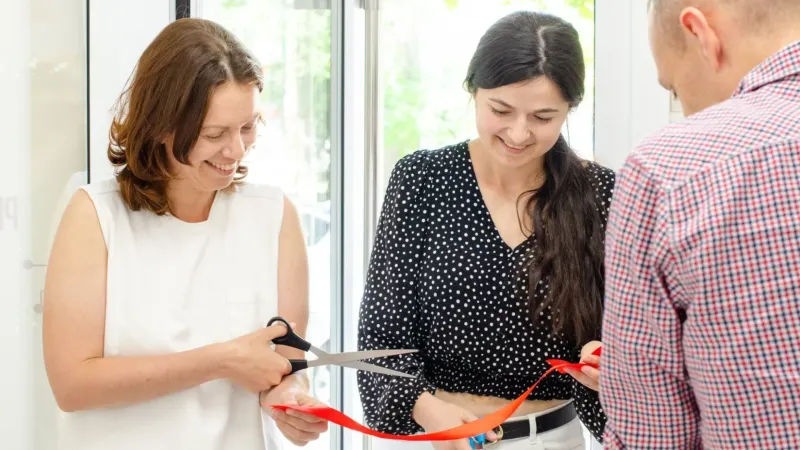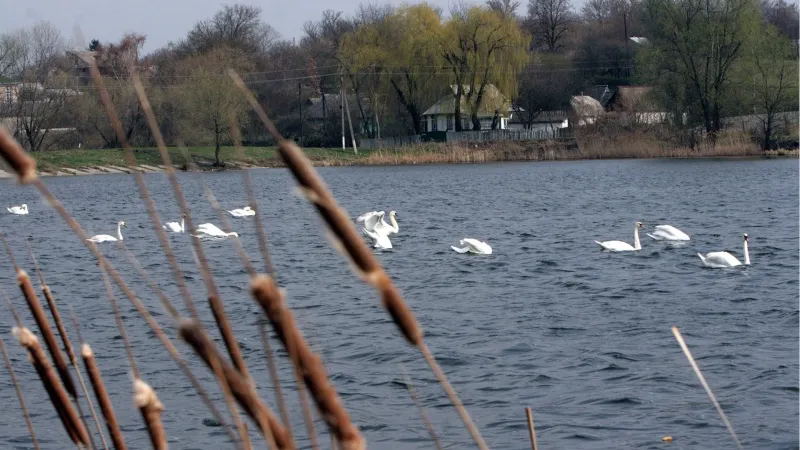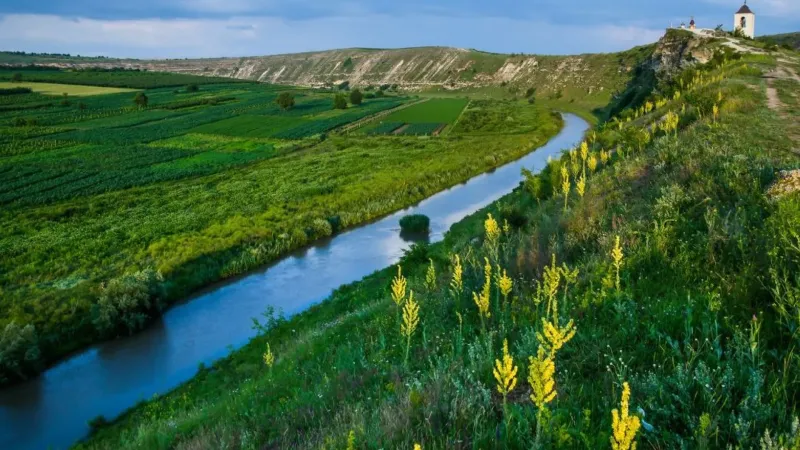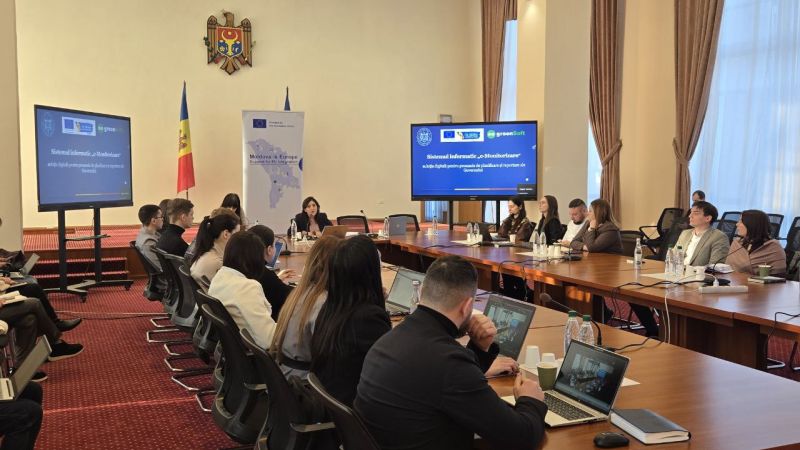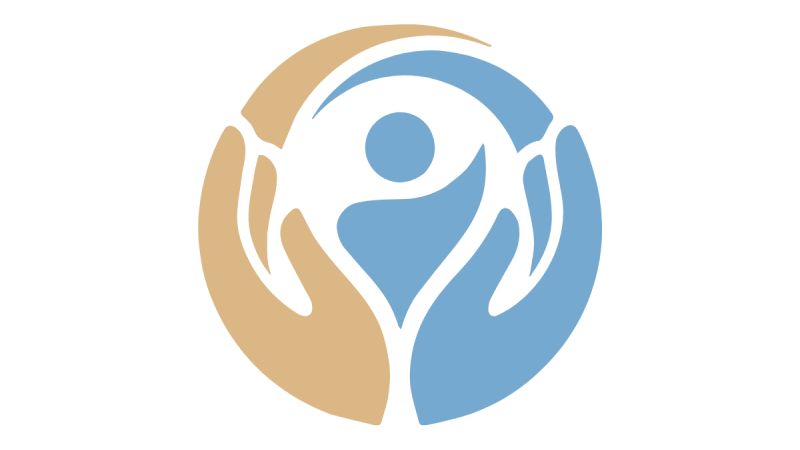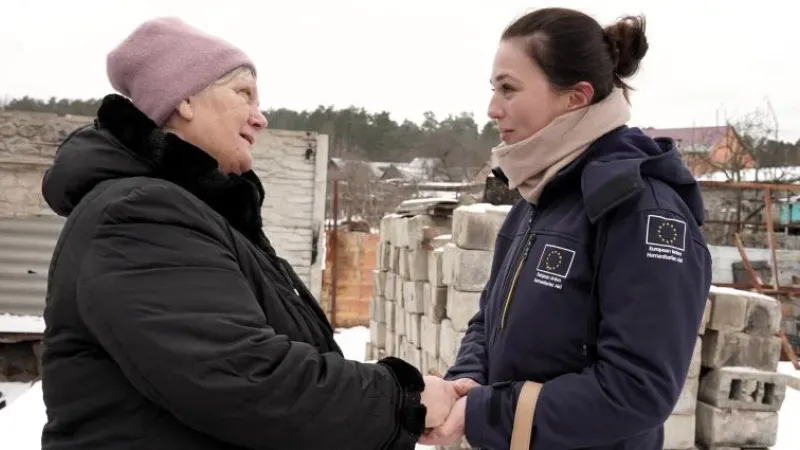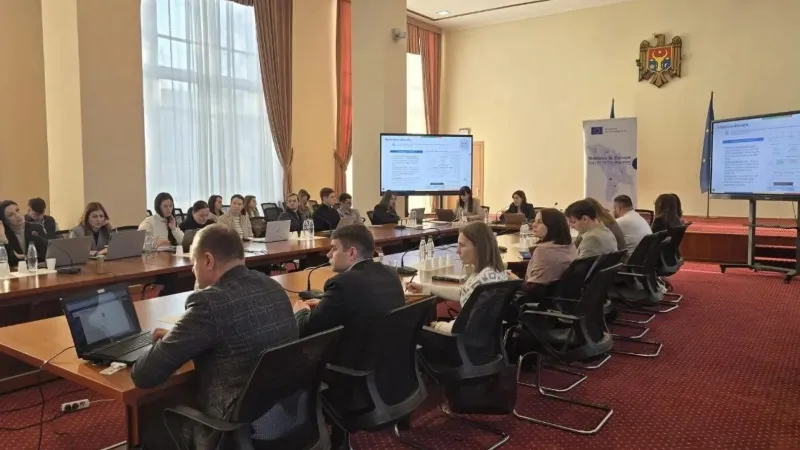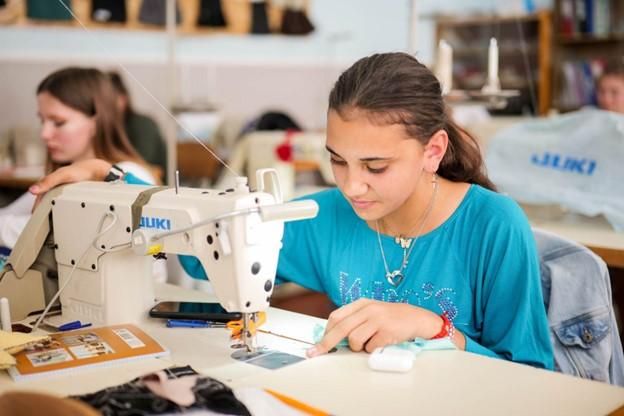
Locul în care învățarea nu este doar un proces, ci și o călătorie de autodescoperire. Exemplul unei școli din Orhei
Integrarea tinerilor cu cerințe educaționale speciale (CES) în societate reprezintă o prioritate pentru Școala Profesională din orașul Orhei, având în vedere că, ulterior, aceștia să poată să-și găsească un loc de muncă. Timp de doi ani, conținutul curricular al instituției a fost adaptat pentru trei meserii – cusător, silvicultor și tencuitor. Astfel, programul de studii a devenit mai accesibil pentru cei peste 20 de elevi cu CES, care doresc să învețe o meserie.
În această instituție, învățarea nu este doar un proces, ci o călătorie transformată cu grijă pentru a fi accesibilă copiilor cu CES care vor să își descopere pasiunea în lumea meseriilor.
Aici am cunoscut-o pe Mădălina, o tânără cu cerințe educaționale speciale de 17 ani, pasionată de arta cusătoriei. În timp ce cosea cu multă dibăcie, ea ne-a dezvăluit că această meserie îi este foarte dragă.
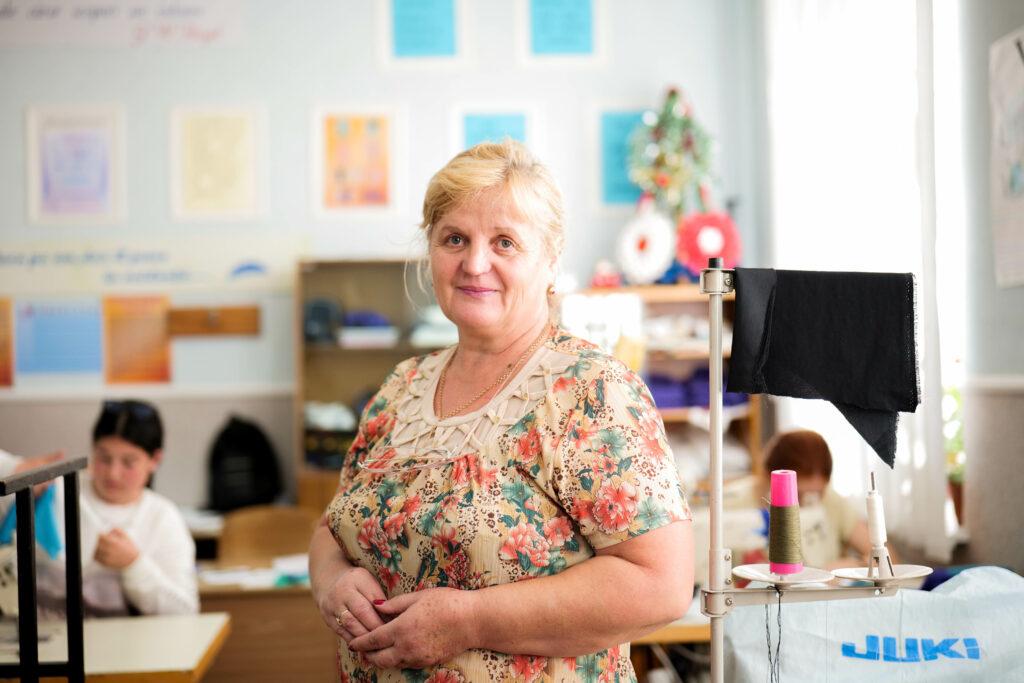
Portretul Ecaterinei, profesoara care instruiește elevii la specialitatea de cusătorie
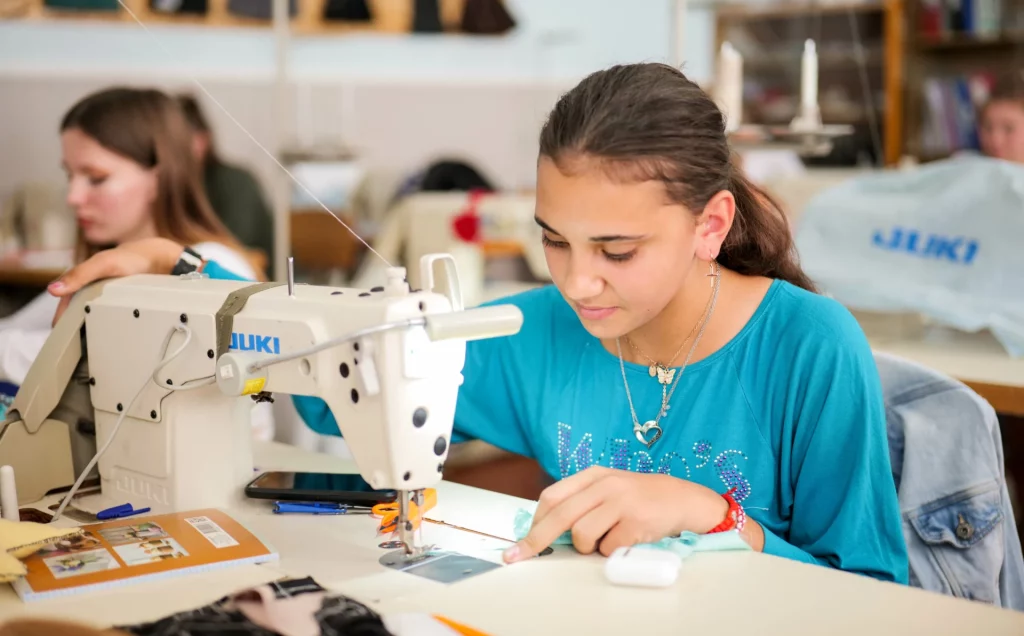
Mădălina, o tânără cu cerințe educaționale speciale de 17 ani, pasionată de arta cusătoriei
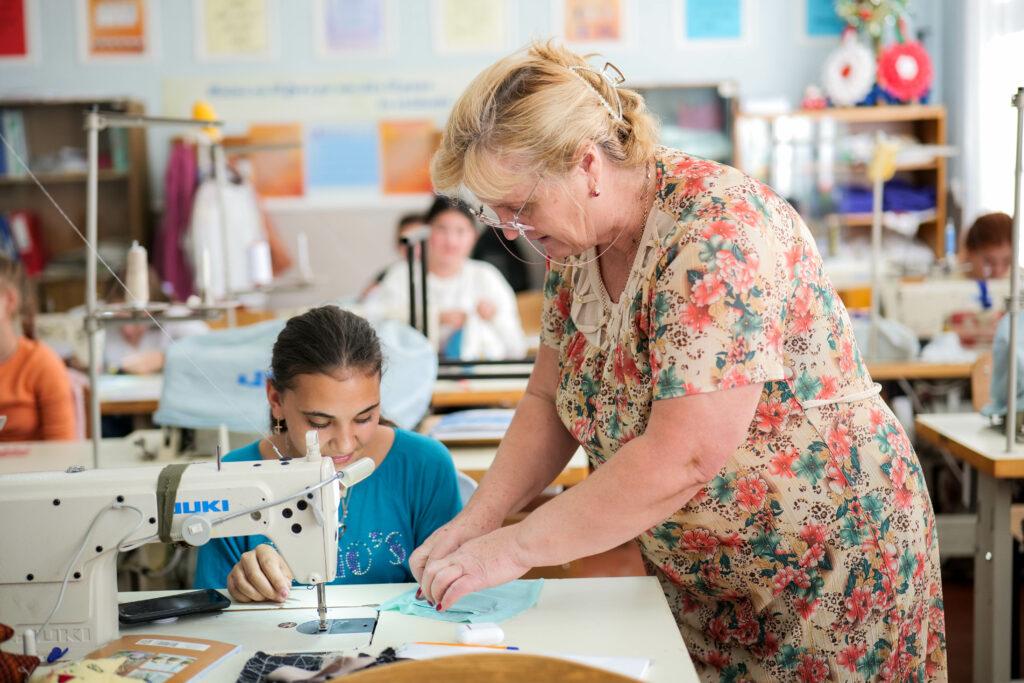
Doamna Ecaterina îi arată Mădălinei procesul de coasere a buzunarului pentru șorțuleț
„Timp de un an și jumătate învăț meseria de cusătoreasă și îmi doresc să termin studiile. Mai am de învățat jumătate de an. Nu-mi pare nimic dificil în ceea ce fac, chiar din contra – procesul de a coase este foarte ușor”, ne-a mărturisit Mădălina cu zâmbetul pe buze.
În lumea creativă a cusătoriei, Mădălina a găsit nu doar o meserie, ci și o sursă de încredere în propriile puteri. Ea consideră că toți cei care vor să îmbrățișeze meseria de cusătoreasă, o pot face cu ușurință la această școală: „Dacă sunt și alți copii care vor să învețe această meserie, îi îndemn să vină aici la școală”.
Cot la cot cu elevii muncește profesoara lor, doamna Ecaterina. Deja de trei ani la rând, ea ajută elevii să fie mai aproape de meseria pe care vor să o profeseze. Cea mai mare satisfacție o are, desigur, atunci când elevii evoluează.
„Ei se descurcă foarte bine. Mădălina, dacă inițial era timidă și mai greu deprindea anumite procese, acum se descurcă cu toate cerințele. Chiar singură a cusut un șorțuleț printre primele fete.”
Ziua obișnuită a unui elev care studiază această meserie începe cu teoria de coasere și direct după aceasta se aplică în practică cele învățate la ore.
„Am două grupe de fete la specialitatea de cusătoreasă – aceasta de anul II și deja anul I. Inițial, când vin la noi, nu au deprinderile necesare, fiindcă în școlile generale nu se practică cusătoria. Dacă exersezi în fiecare zi se observă cum progresează”, ne povestește profesoara.
În aceeași clasă, am cunoscut o altă tânără cu CES. Ludmila are, la fel, 17 ani și al doilea an învață la specialitatea de cusătoreasă.
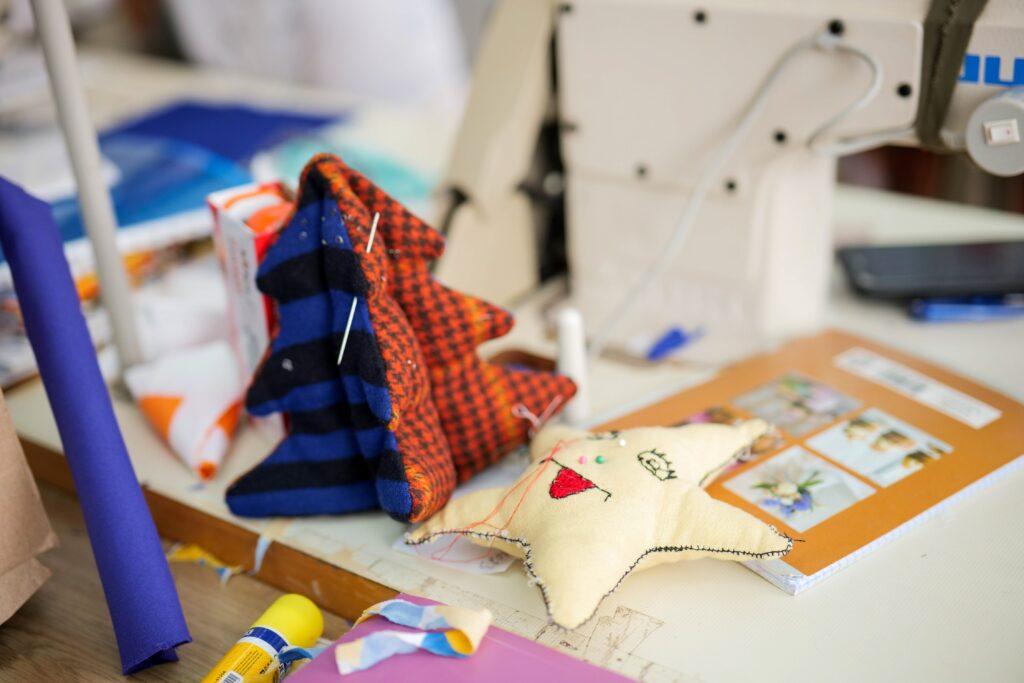
Lucrări diferite ale elevilor
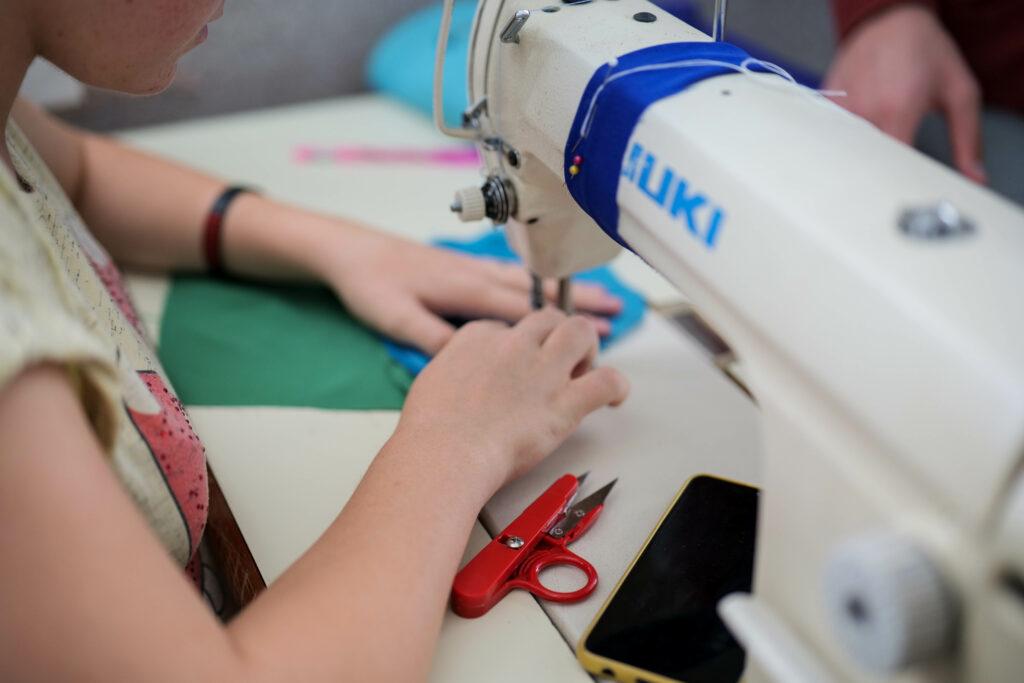
Ludmila, în procesul de creație a elementelor pentru rochie
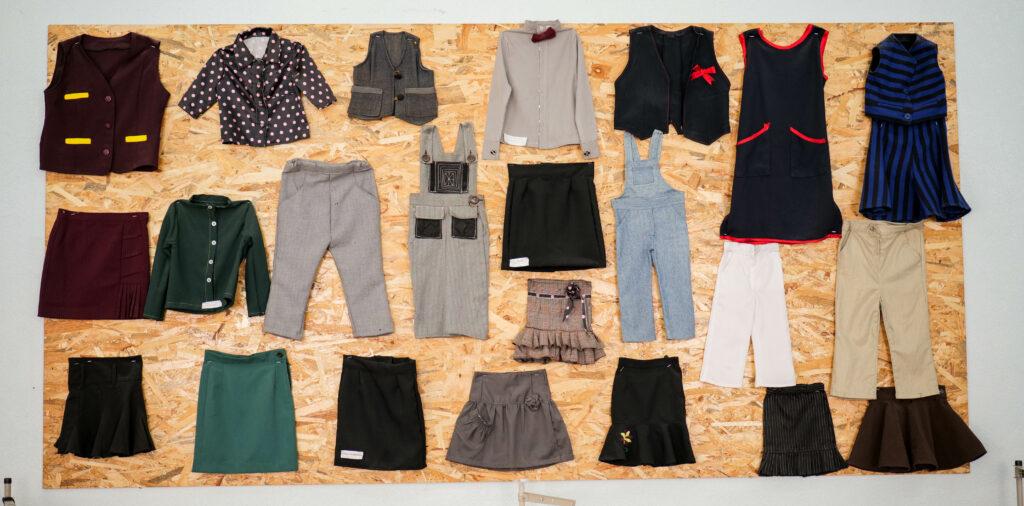
Câteva dintre lucrările făcute de elevele de la specialitatea cusătoreasă
Tânăra ne-a povestit că poate coase o rochie în doar patru zile, iar partea cea mai dragă îi este confecționarea buzunarelor.
„Nu este dificil de făcut. Un buzunar îmi ia o oră ca să-l fac. Am făcut și alte lucrări: șorțuri, buzunarul lateral și altele. Cel mai mult îmi place să cos buzunarele, se fac cel mai ușor.”
Pe lângă activitățile de la școală, Ludmila ne spune, că reușește să lucreze și acasă, ajutându-și familia la diferite treburi. În viitor, se gândește să-și facă din meseria studiată un job adevărat.
Nu departe de blocul central al școlii, unde am vizitat clasa de croitorie, se află atelierul meseriei de tencuitor. Tinerii care vor să însușească această specialitate exersează de trei ori pe săptămână alături de profesorul lor.
Printre elevii care învață această meserie se află și Alexandru, un tânăr de 17 ani cu CES, care ne-a mărturisit că îi place ceea ce face aici.
Tânărul se află deja în anul doi la specialitatea de tencuitor. Acest lucru înseamnă că la sfârșitul anului de studii va putea să se angajeze în câmpul muncii, având o meserie.
„După ce termin școala vreau să lucrez mai departe în domeniu. Noi avem orele practice de trei ori pe săptămână, iar în afara lor facem lecțiile teoretice. După ce învățăm teoria, venim și implementăm în atelier ceea ce am învățat”, menționează tânărul.
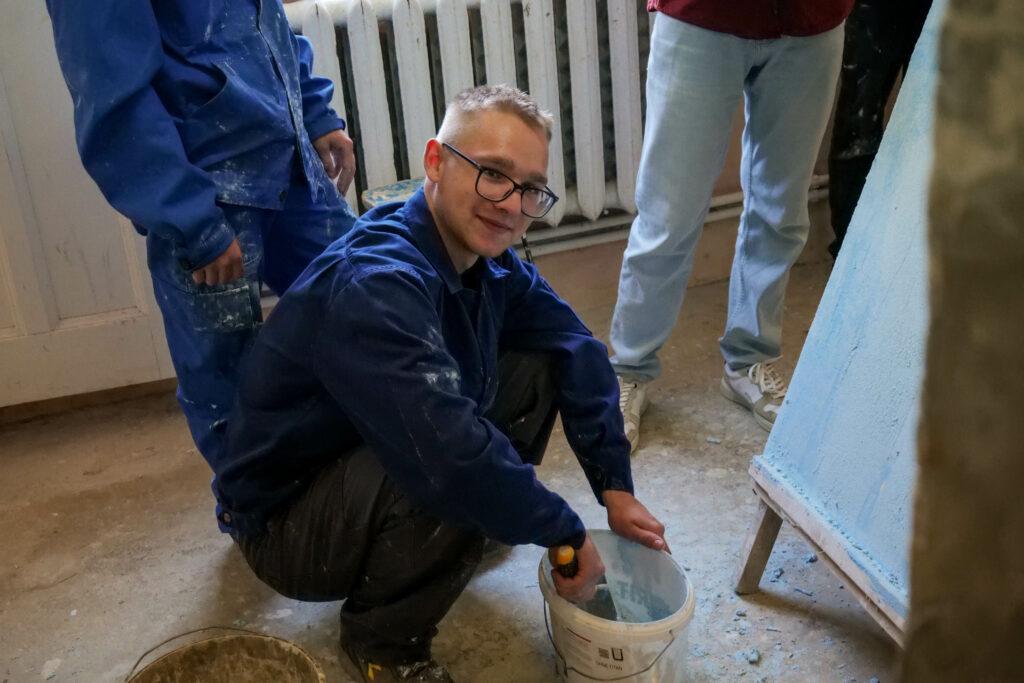
Alexandru, în procesul de exersare la ora practică
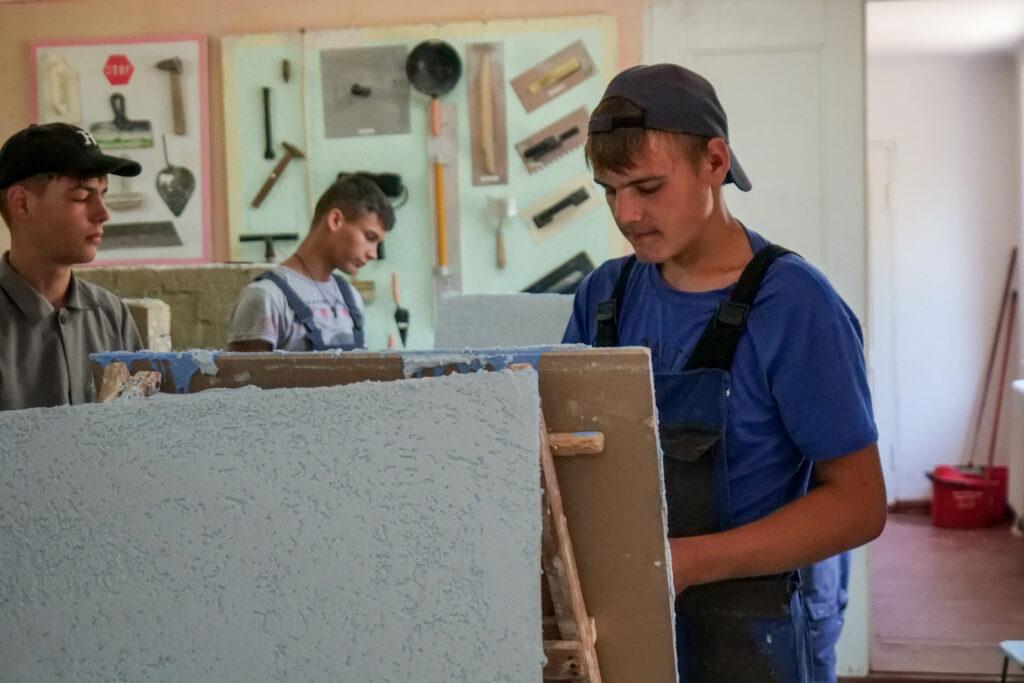
Elevii exersează la ora de practică cum să aplice corect tencuiala
La sfârșitul anului de studii, elevii vor susține un examen de calificare, în care vor trebui să îndeplinească o sarcină ce atestă că au dobândit competențele necesare pentru meseria de tencuitor.
Școala Profesională Orhei pregătește specialiști în mai multe domenii: strungari multiprofili, tencuitori, mecanici auto, cusători, silvicultori etc. Pentru a face unele dintre aceste meserii accesibile și tinerilor cu cerințe educaționale speciale, curricula a fost adaptată și profesorii au fost instruiți.
Cum a început ajustarea instituției la necesitățile copiilor cu CES
Cadrele didactice au fost ghidate de un consultant specializat, care împreună au adaptat conținutul curriculei pentru trei meserii – cusător, silvicultor și tencuitor – pentru predare elevilor cu CES și au beneficiat de un program de instruire în domeniul educației incluzive, bazată pe drepturi și nevoi individuale ale tinerilor. În prezent, tinerii beneficiază de suport pentru a-și dezvolta abilitățile sociale și profesionale, pentru a obține un loc de muncă și integrare în comunitate.
„Adaptarea programului celor trei curricule pentru copiii cu CES a făcut posibil ca materialul la obiectele de specialitate să fie predat într-o modalitate mai ușoară de înțeles pentru ei. De exemplu, la specialitatea de tencuitor prin desene li se arată cum se aplică tencuiala și din ce constă ea. Totuși, elevii au și obiecte de cultură generală: matematică, informatică, limba română etc.”, spune Tatiana Ciobanu.
Ea menționează că în cadrul instituției de învățământ nu se face diferență dintre copiii cu cerințe educaționale speciale și ceilalți elevi.
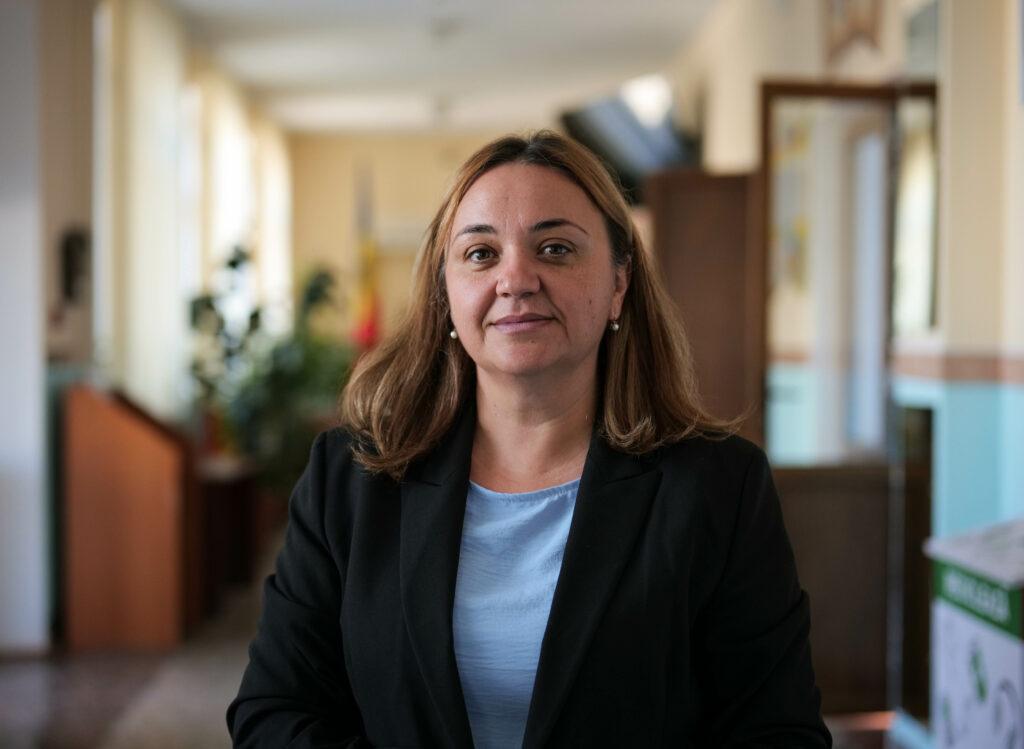
Portretul Tatianei Ciobanu, directoare adjunctă a Școlii profesionale din Orhei
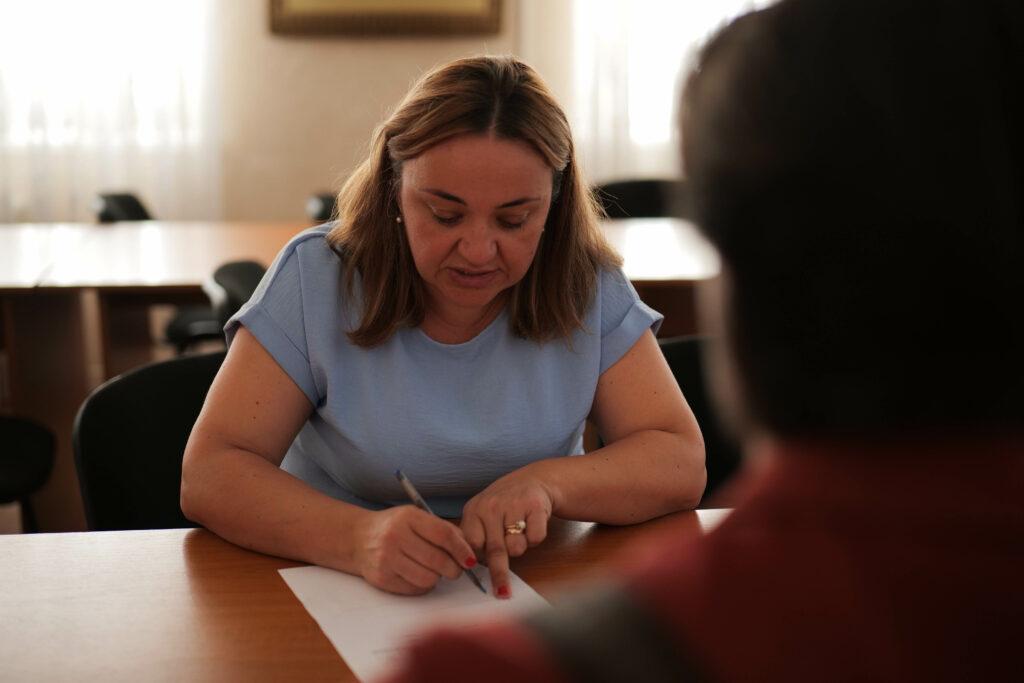
Tatiana Ciobanu ne explică care sunt problemele cu care se confruntă elevii la angajare
„La noi în instituție toți sunt egali între ei. Nu învață separat, pur și simplu în planul didactic este specificat că se oferă mai mult timp pentru realizarea unei sarcine copiilor cu CES. Un exemplu: dacă evaluarea este de 45 de minute, copiii cu CES au la dispoziție 90 de minute pentru a îndeplini sarcinile.”
Tatiana Ciobanu recunoaște că este încă dificil să încadreze elevii cu CES în câmpul muncii după ce termină studiile.
„Noi îi pregătim pe copii, îi ajutăm cu deprinderea noilor abilități, dar la încadrarea în câmpul muncii avem o barieră – agenții economici. Va trebui de lucrat încă mult timp cu agenții economici ca să înțeleagă că unele sarcini pot fi făcute și de către elevii noștri. Conform legii ei sunt obligați să-i primească, dar oricum găsesc diferite motive. Unii ne refuză fiindcă suntem la învățământul dual și nu cel clasic. La învățământul dual elevii trebuie să fie plătiți cu un salariu mediu pe țară și să fie ghidați de un instructor delegat de agentul economic.”
Directoarea adjunctă spune că instituția de învățământ are acum 20 de elevi cu cerințe educaționale speciale la toate cele trei specialități din anul I și II. Studiile la o specialitate durează doi ani.
Elevii Școlii profesionale din Orhei de la specialitatea cusător fac practica la un agent economic din Chișinău. Instituția de învățământ a întocmit un acord de colaborare și tinerii cu CES sunt integrați în diferite procese mai simple pe care le pot face. Totodată, tinerii de la celelalte specialități fac practica de specialitate la Orhei.
De asemenea, Tatiana Ciobanu spune că datorită resurselor și mentoratului din cadrul proiectului, au fost adaptate corespunzător două săli de clasă, două camere din cămin, bucătăria, sala de meditații, cantina și biblioteca pentru accesul persoanelor cu nevoi speciale. Totodată, a fost construită o rampă de acces la intrarea în clădirea școlii și au fost adaptate corespunzător două blocuri sanitare – unul din cămin și altul din blocul de studii.
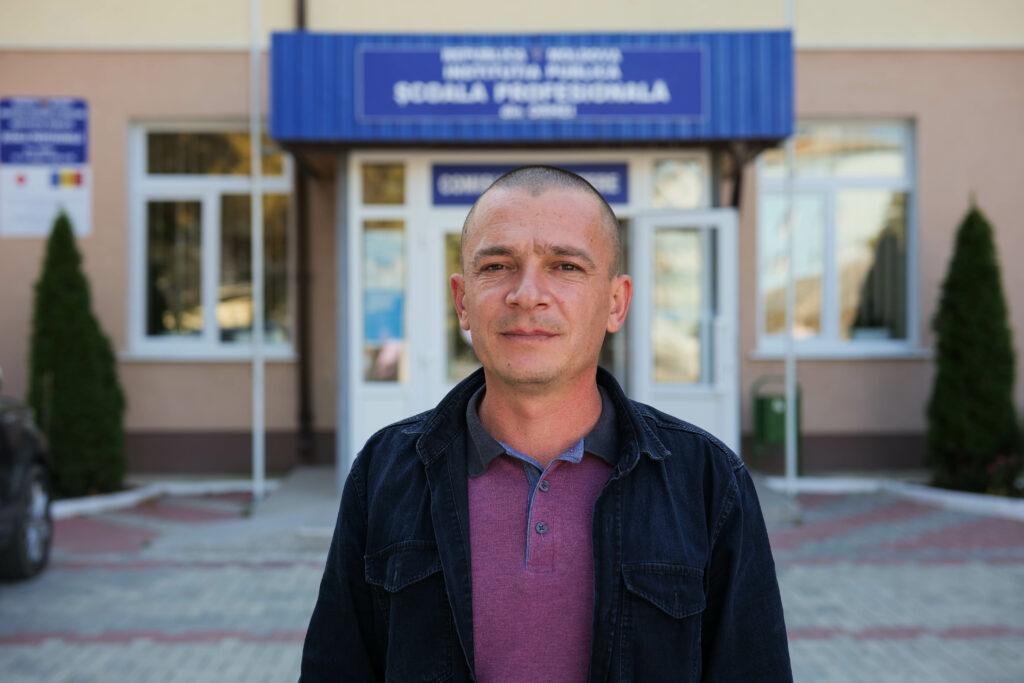
Portretul lui Ion Digori, administratorul Asociației Obștești „Servicii Sociale Durabile”
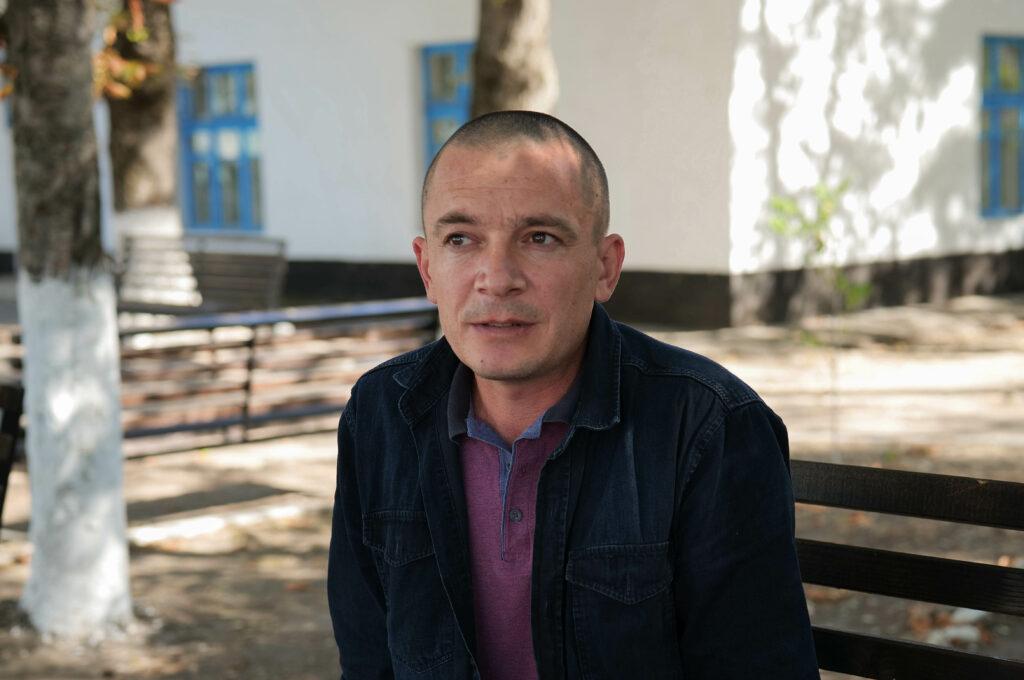
Ion Digori ne povestește despre planurile ulterioare ale asociației
Proiectul a fost implementat cu ajutorul Asociației Obștești „Servicii Sociale Durabile” începând cu luna ianuarie 2022 și a luat sfârșit în vara acestui an. Ion Digori, administratorul asociației spune că după totalizarea proiectului din luna iunie 2023, Școala profesională Orhei este capabilă să gestioneze mai departe toate procesele fără suportul Asociației Obștești.
„Prin colaborarea între diferite structuri și organizații, se pot oferi soluții eficiente și care să răspundă nevoilor și aspirațiilor tinerilor în procesul lor de integrare. Înainte să vină la Școala profesională Orhei, elevii nu făceau față studiilor, programul lor era supraîncărcat. Acum au posibilitatea să studieze după curricula adaptată. Profesorii au trecut prin mai multe instruiri pentru a putea să le asigure predarea eficientă”, menționează Ion Digori.
La fel ca și directoare adjunctă a școlii, Ion Digori spune că există o problemă din partea angajatorilor în ceea ce privește angajarea în câmpul muncii a tinerilor cu cerințe educaționale speciale. În acest sens, el se gândește pe viitor să creeze un proiect pentru a oferi suport persoanelor cu CES care vor să-și găsească un loc de muncă.
Serviciul de integrare socială și profesională a tinerilor cu cerințe educaționale speciale a fost creat de către Asociația Obștească „Servicii Sociale Durabile” în parteneriat cu administrația Școlii profesionale din Orhei, în cadrul proiectului „Organizațiile societății civile acționează pentru servicii sociale mai bune”, finanțat de Uniunea Europeană și Fundația Soros Moldova.
Autor: Petru Beșleaga
